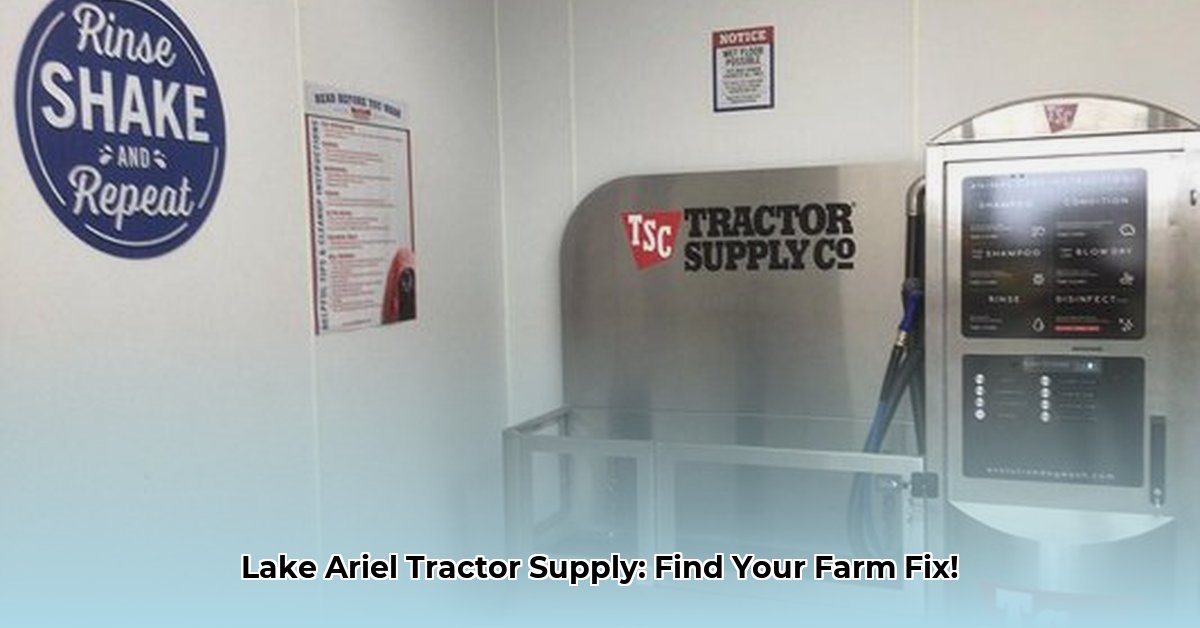
Tractor Supply in Lake Ariel plays a significant role in the local agricultural ecosystem, serving both large-scale farms and backyard gardeners. This article examines its contribution to sustainable agriculture, highlighting its strengths and weaknesses, and offering actionable steps for improved sustainability within the Lake Ariel community. We'll explore how Tractor Supply can better support sustainable farming practices in the region. For additional examples of successful sustainable practices, see this case study.
Tractor Supply Lake Ariel: A Closer Look
Tractor Supply's Lake Ariel location (1) offers a wide array of products, from animal feed and fencing to seeds and tools. Its proximity to several smaller towns makes it a crucial resource for farmers who may lack access to specialized suppliers. This convenience is a significant advantage, but its impact on sustainable agriculture requires closer scrutiny. How can we ensure this convenience aligns with environmentally responsible practices?
Analyzing Tractor Supply's Contribution to Sustainable Agriculture
Tractor Supply's role in sustainable agriculture presents a mixed picture. The accessibility of essential supplies undeniably benefits local farmers and promotes the growth of backyard farming initiatives, like raising backyard poultry. However, a critical area needing improvement is the lack of transparency concerning product sourcing and sustainability certifications. This lack of information hinders informed consumer choices.
Positives:
- Accessibility and Convenience: Provides a one-stop shop for a wide range of farming and gardening supplies, simplifying the process for local farmers and gardeners.
- Support for Small-Scale Farming: Facilitates the burgeoning trend of backyard farming and urban agriculture by readily supplying essential materials.
- "Subscribe & Save" Program: This program reduces unnecessary waste by allowing for scheduled deliveries.
Shortcomings:
- Lack of Transparency in Sourcing: The origin of products and their associated environmental impacts are often unclear. This absence of information makes it difficult for consumers committed to sustainable practices to make informed choices.
- Limited Sustainability Certifications: The absence of clear labeling regarding organic certifications or other sustainability standards hampers the ability of consumers to identify truly eco-friendly products.
- Potential Supply Chain Risks: Supply chain disruptions pose a significant risk, highlighting the need for diversified sourcing and robust logistics to ensure a consistent supply of essential goods. (See accompanying risk assessment matrix below).
Risk Assessment Matrix
| Risk Category | Likelihood | Impact | Mitigation Strategy |
|---|---|---|---|
| Supply Chain Disruptions | Moderate | High | Diversify sourcing; establish strong supplier relationships; robust logistics |
| Sustainability Concerns | Low | Moderate | Increase transparency; pursue certifications; promote sustainable product choices |
| Increased Competition | Moderate | Moderate | Improve customer service; offer unique value-added services; focus on niche markets |
| Regulatory Changes | Low | Moderate | Continuously monitor regulatory updates; adapt business practices accordingly |
Actionable Steps Towards a Greener Future
To enhance Tractor Supply's contribution to sustainable agriculture, collaborative effort is crucial.
1. For Tractor Supply:
- Enhance Supply Chain Transparency: Implement a comprehensive review of the entire supply chain, clearly identifying the origin of products and their environmental footprint.
- Improve Product Labeling: Clearly label products with sourcing information and relevant sustainability certifications where applicable.
- Invest in Traceability Systems: Implement systems to track products from origin to shelf, ensuring accountability and transparency.
- Partner with Local Sustainable Farms: Prioritize partnerships with local farms dedicated to sustainable practices to increase the availability of eco-friendly products.
2. For Local Farmers:
- Strategic Sourcing: Carefully evaluate all suppliers, prioritizing those with demonstrably sustainable practices.
- Collective Advocacy: Collaborate with fellow farmers to advocate for improved product labeling and sustainable practices.
3. For Consumers:
- Ask About Sourcing: Inquire about product origins and certifications directly with Tractor Supply staff to encourage transparency.
- Support Sustainable Businesses: Prioritize businesses committed to responsible sourcing and environmental responsibility.
4. For Local Government:
- Incentivize Sustainable Farming: Introduce programs and incentives to encourage the adoption of environmentally friendly farming practices.
- Provide Transition Support: Offer resources and programs to assist farmers in transitioning to sustainable agricultural methods.
Conclusion: A Shared Commitment to Sustainability
Building a thriving and sustainable agricultural community in Lake Ariel necessitates a shared vision and collaborative effort. Tractor Supply, as a key player, has a critical role to play. By embracing transparency, responsible sourcing, and environmental stewardship, Tractor Supply can solidify its position as a partner in building a greener future for Lake Ariel’s agricultural community. The journey is ongoing, requiring continued dialogue and sustained action.